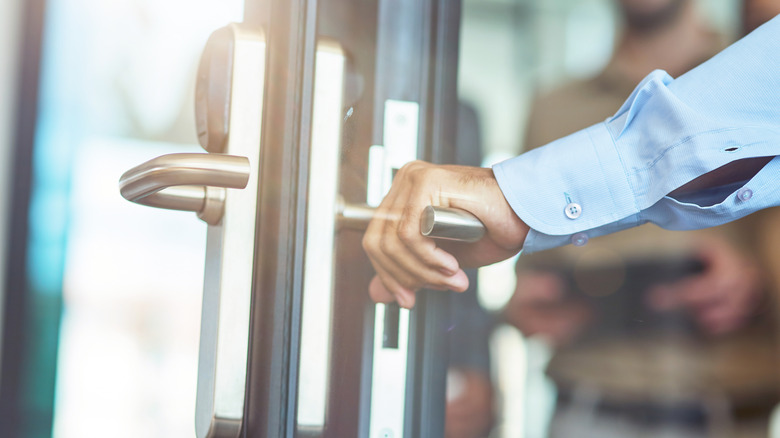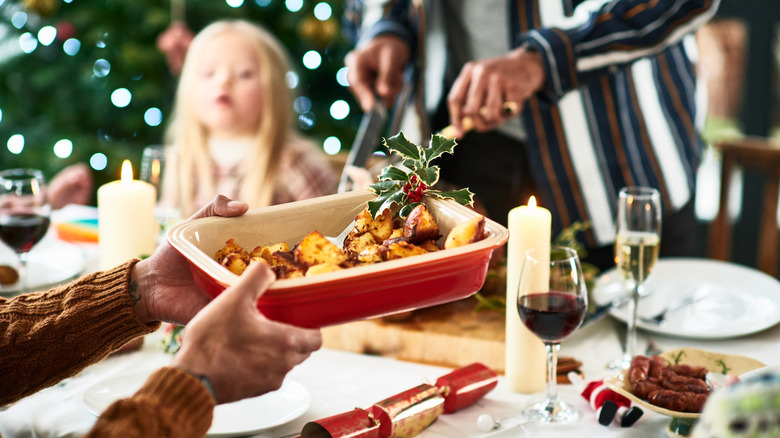Unspoken Etiquette Rules You Need To Know Before Traveling Around The American South
The American South is a landscape steeped in tradition. It's a place that routinely features a slower pace of life and a community always willing to lend a helping hand. Southerners have grown up with many traditional sensibilities that run deep. This leads many from the region to follow a core set of values that are central to their being. They adhere to strict mannerisms that can feel odd or confusing to an outsider (there's even a set of "polite" etiquette rules you should avoid in the South). There are the obvious outward gestures that everyone with a TV will be able to put their finger on: The "yes, ma'ams" and door-holding actions that are easily visible, for instance. But there's a lot more to Southern manners than just holding the elevator door for a stranger, prompting deep curiosity in us.
To understand the sometimes-secret language of Southern etiquette, we had a chat with Ms. Nikesha Tannehill Tyson, an etiquette expert from the Swann School of Protocol in Shreveport and author of the book "Going Public: Culture, Custom, and Class for Social Success." She gave us some key insights into how etiquette can dictate interactions in the South and mark a person as polite, or perhaps as not so considerate. Tyson spoke about Southern hospitality, conversational etiquette, and some key tenets of the Southern way. As she notes, "Etiquette is about putting others at ease by practicing two of the three core values of etiquette: respect and consideration." The expert emphasizes that even "When a traveler makes a mistake but shows genuine effort, humility, and appreciation, most locals will forgive the blunder" and still be welcoming.
Always be polite in conversations
Politeness is a way of life in the American South. Whether traversing the best national parks the South has to offer or exploring some of the region's most underrated cities, you should expect to hear plenty of "please" and "thank you." But that's not the only polite language expected in routine conversation. Southerners frequently deploy words like "ma'am" and "sir," and add titles in front of people's first names while engaging them in conversation. Don't be surprised to hear "Mr." or "Ms." as a prefix to your first name when checking into a hotel or speaking with a bed and breakfast host. This standard component in language extends from Gatlinburg to Galveston (just a few of the South's most budget-friendly vacation spots) to Eureka Springs and New Orleans, mainly known as the Southern towns with spooky ghost tours.
Tyson tells us that Southerners implement the central values of etiquette in their daily lives as a means of making others feel comfortable. Using these polite words "promotes a pleasant experience for you and fellow travelers," so getting into the spirit of this kind of polite language is a great idea when seeking to integrate yourself into the culture during your travels. Being polite when meeting friends and colleagues shows respect and a level of compassion for others. This little task of being considerate "could be considered the Southern 'way,' and is indicative of good upbringing," she adds.
Hold doors for people
Holding the door open for another or stopping the elevator from closing when you see someone walking toward it in a rush is just polite. This is good practice, no matter where you might be. But southerners take this obligation of politeness to an additional degree. It's not just something you should do; Southerners expect it from others. Therefore, you shouldn't be surprised if people go out of their way to try to ease your movements in this way.
Naturally, holding the door open for someone older is a display of manners. But it's not just certain people that you should do this for. Tyson tells us that "some people may feel slighted or underappreciated" if you fail to hold the door open for them, regardless of their social status, age, or gender. Because this simple gesture of politeness is so common in the American South, you should anticipate that other people will offer it to you. "A simple 'thank you,' followed by holding the door the next time" can go a long way in helping you fit into this culture of manners and thoughtfulness, our guide to Southern etiquette adds.
Put your phone away when engaging with people
A phone is a divisive connectivity tool. On one hand, it can help you interact with people easily across the boundaries of physical space that might otherwise limit your conversational ability. However, there's a time and place to use this device. When exploring the American South, many people will have particularly strong feelings about using your phone while interacting with someone in person.
The modern technology user relies on their phone and other communication tools as a near-extension of themselves. It might not seem like a big deal to pull out your phone to check emails or send a text to someone while in the middle of a conversation. Multitasking with your handheld device is just a part of the modern experience of life. But in the American South, people will be quick to feel slighted by a lack of present mind. Splitting attention can come off as rude no matter where you are, but it's particularly egregious in the South.
Here, attention to detail and personal relationships mean a lot to people. This is true even for acquaintances or strangers the Southerner may meet (such as travelers passing through). Tyson notes, "Most people in the American South are too polite to confront poor etiquette directly. Instead, they may express disapproval through subtle cues or gentle, indirect comments. Rather than calling someone out, a Southerner (especially an elder) may offer a gracious hint to guide the person back on track to correct them without offending."
Pleasantries in passing are to be expected
As noted, conversation is a big deal to Southerners (and a great way to meet people while engaging in solo travel). Stopping for a chat to catch up with someone you know, even casually, is an important part of the charm that makes these regional Americans who they are. These short conversations show you care about your loved ones and what's going on in their lives. Things move a little slower in the South, and the constant rush of Northern urban sprawl is put on hold when you're here. As a result, people feel not only obligated to stop and chat with others but also enjoy engaging in these interpersonal communications.
Due to this cultural phenomenon, Tyson notes you'll get a nod, smile, or "hello" from numerous people you pass on the street. You should be prepared to give this friendliness back when you experience it. You won't always get to stop and engage in pleasantries, but if someone says hello to you, you should offer them the same kind gesture. If you don't, "this could be perceived as rude." She adds, "If you realize you missed a moment, offering a warm greeting at the next opportunity shows goodwill." This can be a great way to reset with a host or someone you're interacting with on your trip.
Don't forget to engage in chivalrous behaviors
While opening doors for people of all genders is the norm in the South, acts of chivalry remain a key component in interactions between men and women in this region. Men will go out of their way to be chivalrous to the women they come into contact with while going about their daily business. If you are a man visiting this region, you should keep this reality in mind as you explore the treasures Southern states have to offer. Anticipate the little things that can make a woman's day a little brighter: Offer your coat if the temperature starts to dip, or draw her chair as you sit for a drink or meal.
As a woman exploring the South, don't be surprised if people jump at the opportunity to hold open the door for you or offer you a seat while waiting for public transportation. There are plenty of ways that men can engage in little gestures of chivalry to try to make your day better. This is just part of the Southern way, as well. Women, certainly, aren't delicate beings and mustn't be treated so. But leaning into this cultural phenomenon can be a great way to make you feel special and cared for, even with the inherent ability to sit down or open a door for yourself firmly established. Chivalry has long been a core value in the world of good etiquette, and it remains alive and well in this part of the country.
Wait until everyone has been served to begin eating
If you are sitting for a meal with a group of people, it has long been a component of good etiquette to wait for everyone to get their food before tucking into yours. Even if your plate comes first, waiting to begin eating shows a measure of restraint and respect for the people you are with. This is a matter of good manners, and it's a common practice in the American South, in particular. When eating at a restaurant with friends or family in a close-knit group, you might not need to pay careful attention to this etiquette norm. However, Tyson says you should never forget about it when dining with a host showing you around the community.
Hosting others is a significant feature of Southern living. Tyson notes that this frequently includes things like "setting up a guest room with care and personal touches to ensure comfort and a great experience." Hospitality is the difference between the disconnected feel of a hotel (where you're just passing through) and a warm welcome. "Hospitality is appreciated anywhere," she adds, but it's critical to the Southern experience, and it "may include offering home-cooked meals." Waiting for everyone to get their food plays directly into the atmosphere of hosting that Southerners seek to create. No matter how you encounter a group of people in the South for mealtime, waiting to eat with everyone is a small but powerful way of showing your manners.
Always accept food from hosts, even if you aren't hungry
"When offered food, be ready to say 'yes,' saying no can be considered an insult for refusing their hospitality," Tyson states emphatically. This is one of the most important etiquette rules she highlighted when discussing norms in the South that visitors might not know about. Food is an incredibly important signifier in Southern culture. The ability to prepare good food as a host and deliver a memorable and pleasant experience to others is something that all Southerners will strive for.
Saying no might not seem like a big deal, but it can be a major slight in the eyes of someone who has spent hours preparing the offering. However, Tyson notes, "If you must decline, do so gently and with gratitude: "Thank you so much, it looks delicious. I regret being full right now!" Or accept a small portion, even if you don't eat much, to honor the gesture." It's also perfectly reasonable to alert your host to dietary restrictions or allergies. If you have a health issue that prevents accepting or eating something your host has prepared, they will understand.
Engage in small talk with people you meet
Small talk is a part of the human experience at its very center. People shoot the breeze with one another about non-consequential topics all the time. It's such an ingrained part of our day that you might not even notice that you're doing it at all. Discussing the weather with someone next to you on the bus or asking about the relatives of people you know is just something people do. As is the case with many etiquette features, Southerners expand upon the norms of small talk.
The American South is a place of community and tight-knit living. Whether in a city or a rural area, people tend to know each other with greater regularity. This leads to more conversations, and many here will even stop and chat with strangers. Tyson tells us that "small talk is considered a sign of friendliness"; if you don't engage in casual conversation, you "may come across as uninterested or snobby." If you think you may have offended your B&B host or someone else you've encountered while exploring the South, the next time you see them offers an opportunity to reframe the relationship. Tyson suggests something simple, like: "I didn't mean to rush off earlier, how's your day going?" This, she says, "shows an effort to connect" and will make the other person feel appreciated.
There's a right way to be 'lazy'
Most people will be familiar with the powerful visual of the Southern front porch. This is an invaluable relaxation asset, especially on long summer days and warm, comfortable evenings. The front porch is a great place to kick back and watch the world pass by. Carefree relaxation in this kind of atmosphere makes the clock seem to stop. With a good drink and great company added to the mix, relaxing on the porch is a phenomenal way to spend some of your time. A lazy day with friends or even alone with a good book in a setting like this can be hugely rewarding.
Slow living and relaxation are integral to the Southern experience. Southerners don't take themselves too seriously; they might prioritize kicking back and refrain from pumping their schedules full of activities. This doesn't mean they inject a molasses-esque pace into everything they do, though. Indeed, there's a right and a wrong way to be "lazy" in the South. When it comes to work and other obligations you have set for yourself, hard work and diligent attention are the norm. Speed and a job well done are equally critical traits here. However, when the working day is done, kicking off your boots and taking a load off can be an immensely rewarding change of pace that helps you recharge and prepare for whatever might be on the docket in the future.
Don't talk about yourself too much
There's a lot made of conversation in this region. Southerners are quick to stop and chat about daily occurrences in their lives, but you'd be hard-pressed to find a person from this part of the country who stops to make small talk and only focuses on their experiences. Talking about yourself is, of course, a natural part of any conversation. However, anytime you stop for a chat, the polite thing to do is ask about your conversation partner. People around the country will understand this point of politeness, but Southerners are perhaps the most keenly aware of conversational etiquette.
Making yourself the center of a conversation is a great way to be off-putting. As noted, many of the norms that govern Southern etiquette are aimed at creating a welcoming and friendly environment for others. By focusing on yourself rather than them, you inadvertently signal that you're more important and, therefore, more worthy of being talked about. Keeping this in mind and maintaining an equitable conversation makes it comfortable for all. Your friend or acquaintance is likely to ask about you. Therefore, focusing on them gives each participant a chance to discuss what's going on in their life. It also shows interest and respect toward your conversation partner.










